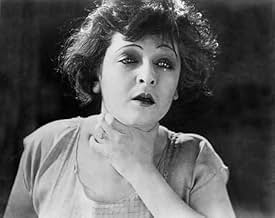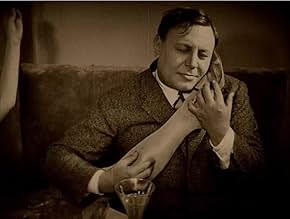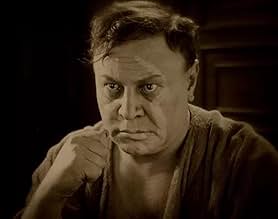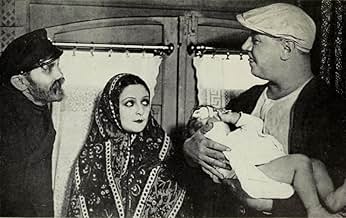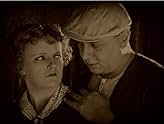PUNTUACIÓN EN IMDb
7,4/10
1,5 mil
TU PUNTUACIÓN
"Boss", quien ha pasado diez años en la cárcel y lleva un espectáculo barato con su mujer, añora su vieja vida de glamour con el circo."Boss", quien ha pasado diez años en la cárcel y lleva un espectáculo barato con su mujer, añora su vieja vida de glamour con el circo."Boss", quien ha pasado diez años en la cárcel y lleva un espectáculo barato con su mujer, añora su vieja vida de glamour con el circo.
- Dirección
- Guión
- Reparto principal
- Premios
- 3 premios en total
The Flying Codonas
- Acrobatic Ensemble
- (as Die Drei Codonas)
Reseñas destacadas
Among silent film conneisseurs Herr Ewald André Dupont is well-known for a trilogy of films; "Varieté" (1925), "Moulin Rouge" (1928) und "Piccadilly" (1929); they all explore troubled relationships against a background of twenties popular entertainment (music-hall, cabarets, vaudeville). Of these, "Varieté" is certainly the best and Herr Dupont's masterpiece, an excellent film that maintains intact its virtues and cinematic merits after so many years, This Herr Graf revisited it recently and found that it had lost none of its power.
The love story involves Herr "Boss" Huller ( Herr Emil Jannings ) and the seductive orphan Frau Berta-Marie ( Fay Lya de Putti ) Once a famous trapeze artist, "Boss" has been reduced to managing a sordid fairground attraction together with his wife ( Frau Maly Delschaft ). He falls madly in love with Berta-Marie and seeks to start a new life with his lover, leaving his wife and child behind.
The virtuosity in the dramatic use of the camera-work together with film narrative by Herr Dupont is simply great. Through the eyes of "Boss'", Dupont skilfully compares the young and vital Berta-Marie and the faded and worn wife. Later the camera shoots from behind Huller's back to depict a desperate man utterly defeated and broken. The expressive close-ups wherein hidden feelings are made transparent are also superb as is the portrait of the people of Berlin, inhabitants of a decadent but thrilling city. The frenzied nightlife of Weimar Berlin (Wintergarten, Vaudeville Theater, fairgrounds) is vividly captured by the camera-work of Herr Karl Freund und Herr Carl Hoffmann.
The camera-work is especially impressive during the trapeze sequences wherein Herr Dupont, with the aid of optical special effects by Herr Ernst Kunstmann, employs many different camera angles to emphasize the riskiness of the trapeze act and the riskiness of the relationship between "Boss", Berta-Marie and their partner, the famous artist Herr Artinelli ( Herr Warwick Ward ) . The tension builds during the performance because we know that Herr "Boss" has discovered that Berte-Marie and Artinelli have become lovers.
The actors are splendid, specially Herr Jannings who, when properly directed , can express powerfully the most inner and divergent human feelings, Frau Lya de Putti, is no femme fatale type at all but that certainly is the point; she's attractive enough but common, someone easily charmed by a stylish man like Herr Artinelli.
"Varieté" is an exemplary work wherein all the achievements and virtuosity of German cinema of that time are on display. You have Expressionism intertwined with social comment, a fascinating portrait of the times. Dupont's wavers a bit at the end and allows a minor concession which is forgivable and by no means fatal to the film as a whole.
And now, if you'll allow me, I must temporarily take my leave because this German Count must refuse a splendid offer to be a fairground attraction.
The love story involves Herr "Boss" Huller ( Herr Emil Jannings ) and the seductive orphan Frau Berta-Marie ( Fay Lya de Putti ) Once a famous trapeze artist, "Boss" has been reduced to managing a sordid fairground attraction together with his wife ( Frau Maly Delschaft ). He falls madly in love with Berta-Marie and seeks to start a new life with his lover, leaving his wife and child behind.
The virtuosity in the dramatic use of the camera-work together with film narrative by Herr Dupont is simply great. Through the eyes of "Boss'", Dupont skilfully compares the young and vital Berta-Marie and the faded and worn wife. Later the camera shoots from behind Huller's back to depict a desperate man utterly defeated and broken. The expressive close-ups wherein hidden feelings are made transparent are also superb as is the portrait of the people of Berlin, inhabitants of a decadent but thrilling city. The frenzied nightlife of Weimar Berlin (Wintergarten, Vaudeville Theater, fairgrounds) is vividly captured by the camera-work of Herr Karl Freund und Herr Carl Hoffmann.
The camera-work is especially impressive during the trapeze sequences wherein Herr Dupont, with the aid of optical special effects by Herr Ernst Kunstmann, employs many different camera angles to emphasize the riskiness of the trapeze act and the riskiness of the relationship between "Boss", Berta-Marie and their partner, the famous artist Herr Artinelli ( Herr Warwick Ward ) . The tension builds during the performance because we know that Herr "Boss" has discovered that Berte-Marie and Artinelli have become lovers.
The actors are splendid, specially Herr Jannings who, when properly directed , can express powerfully the most inner and divergent human feelings, Frau Lya de Putti, is no femme fatale type at all but that certainly is the point; she's attractive enough but common, someone easily charmed by a stylish man like Herr Artinelli.
"Varieté" is an exemplary work wherein all the achievements and virtuosity of German cinema of that time are on display. You have Expressionism intertwined with social comment, a fascinating portrait of the times. Dupont's wavers a bit at the end and allows a minor concession which is forgivable and by no means fatal to the film as a whole.
And now, if you'll allow me, I must temporarily take my leave because this German Count must refuse a splendid offer to be a fairground attraction.
The print I saw recently did not contain the "prologue" mentioned above, which I assume was lifted from the novel on which the film was based. If it had been included in some form, it would have made several things clearer: 1) where "Boss" got his nickname; 2) why he was so much older than Berta-Marie; 3) why so much older (and less in-shape) a man would still be a trapeze artist; 4) why the couple seemed so puppyishly in love at the beginning, he to the point of slavishness; and 5) why "Boss" would be so jealous when Artinelli shows attentions to Berta.
None of this is absolutely necessary to enjoy the film, however, which has beautifully detailed performances and terrific camerawork by Karl Freund. The trapeze sequences will leave you giddy. The montages of variety acts are witty and vibrant. Berlin nightlife in the '20s looks glamorous. And Jannings surely has one of the classic silent-screen actors' faces, eloquently conveying a wide spectrum of emotions.
"Variete" was a sensation when it appeared, primarily for its camerawork. At the time, director EA Dupont took most of the kudos and seemed launched on a promising career. But he was tapped out after his next flick, the estimable "Picadilly," and in retrospect, Freund is the creative force whose part in "Variete" assumes a place in a major body of film work. That being said, Dupont's work with the actors here is outstanding and a key part of the film's success.
None of this is absolutely necessary to enjoy the film, however, which has beautifully detailed performances and terrific camerawork by Karl Freund. The trapeze sequences will leave you giddy. The montages of variety acts are witty and vibrant. Berlin nightlife in the '20s looks glamorous. And Jannings surely has one of the classic silent-screen actors' faces, eloquently conveying a wide spectrum of emotions.
"Variete" was a sensation when it appeared, primarily for its camerawork. At the time, director EA Dupont took most of the kudos and seemed launched on a promising career. But he was tapped out after his next flick, the estimable "Picadilly," and in retrospect, Freund is the creative force whose part in "Variete" assumes a place in a major body of film work. That being said, Dupont's work with the actors here is outstanding and a key part of the film's success.
In 1915 Germany, burly trapeze artist Emil Jannings (as Stephan "Boss" Huller) leaves his wife and partner for sultry young Lya de Putti (as Berta-Marie). Soon, the carnival performing pair are hired by famed trapezist Warwick Ward (as Artinelli), after his flying brother is derailed by a fall. The high swinging threesome is an immediate success. But, after his trimmer partners begin to take care of their mutual attraction, Mr. Jannings must commit the crime for which he serves ten years in prison - as revealed in the present-day prologue. No doubt, it's going to get nasty
Appearing decidedly middle-aged, and with his overweight figure impossible to disguise, Jannings is miscast to the point of ridiculous. But, he was so popular most viewers accepted Jannings as the trim athletic "catcher" flying high. For American consumption, Paramount left out Jannings' adulterous first act (and trimmed the remainder of the film). This softens Jannings' character, of course. The film cutters did leave in some flashes of female nipple. That, Jannings, and some great camera-work from Karl Freud made "Varieté" a critical and commercial success in the US.
****** Varieté (11/16/25) E.A. Dupont ~ Emil Jannings, Lya de Putti, Warwick Ward, Maly Delschaft
Appearing decidedly middle-aged, and with his overweight figure impossible to disguise, Jannings is miscast to the point of ridiculous. But, he was so popular most viewers accepted Jannings as the trim athletic "catcher" flying high. For American consumption, Paramount left out Jannings' adulterous first act (and trimmed the remainder of the film). This softens Jannings' character, of course. The film cutters did leave in some flashes of female nipple. That, Jannings, and some great camera-work from Karl Freud made "Varieté" a critical and commercial success in the US.
****** Varieté (11/16/25) E.A. Dupont ~ Emil Jannings, Lya de Putti, Warwick Ward, Maly Delschaft
Wonderful cinematagraphy and cutting influenced other films of the day. The story is old, but made interesting by the acting, sets and location shooting. The trapeze act shots are well worth seeing, though vaudeville and circus fans will be unhappy that there are few other acts shown. However, a 30 or 45 second summary of the variety (vaudeville) show is clever.
The print I saw at New York's Museum of Modern Art did not have the 'prolog' either. Perhaps it was omitted when the film was released in the US.
The print I saw at New York's Museum of Modern Art did not have the 'prolog' either. Perhaps it was omitted when the film was released in the US.
Variete is a well-directed and well-acted morality play. Chock full of cynical humor and ironic twists, it keeps your attention throughout in expert fashion until the last 20 minutes of the movie. Then things unravel too quickly and too obviously to hit home with the intended impact of the final irony. Still, I give it 7 out of 10.
¿Sabías que...?
- CuriosidadesAmerican humorist S. J. Perelman was so taken with this movie he wrote about it 40 years later in an essay entitled "And, in the Center Ring, That Stupendous Death-Defying Daredevil..." He said "Alfredo Cordona, the wizard of the flying rings, and his partners doubled for the actors. I saw the picture four times, reacting so volcanically to Cordona's forward triple somersault that I almost rent the chair in front of me to matchwood."
- ConexionesEdited into Prisoner of Paradise (2002)
Selecciones populares
Inicia sesión para calificar y añadir a tu lista para recibir recomendaciones personalizadas
Detalles
Taquilla
- Recaudación en Estados Unidos y Canadá
- 709.613 US$
- Duración
- 1h 44min(104 min)
- Mezcla de sonido
- Relación de aspecto
- 1.33 : 1
Contribuir a esta página
Sugerir un cambio o añadir el contenido que falta



